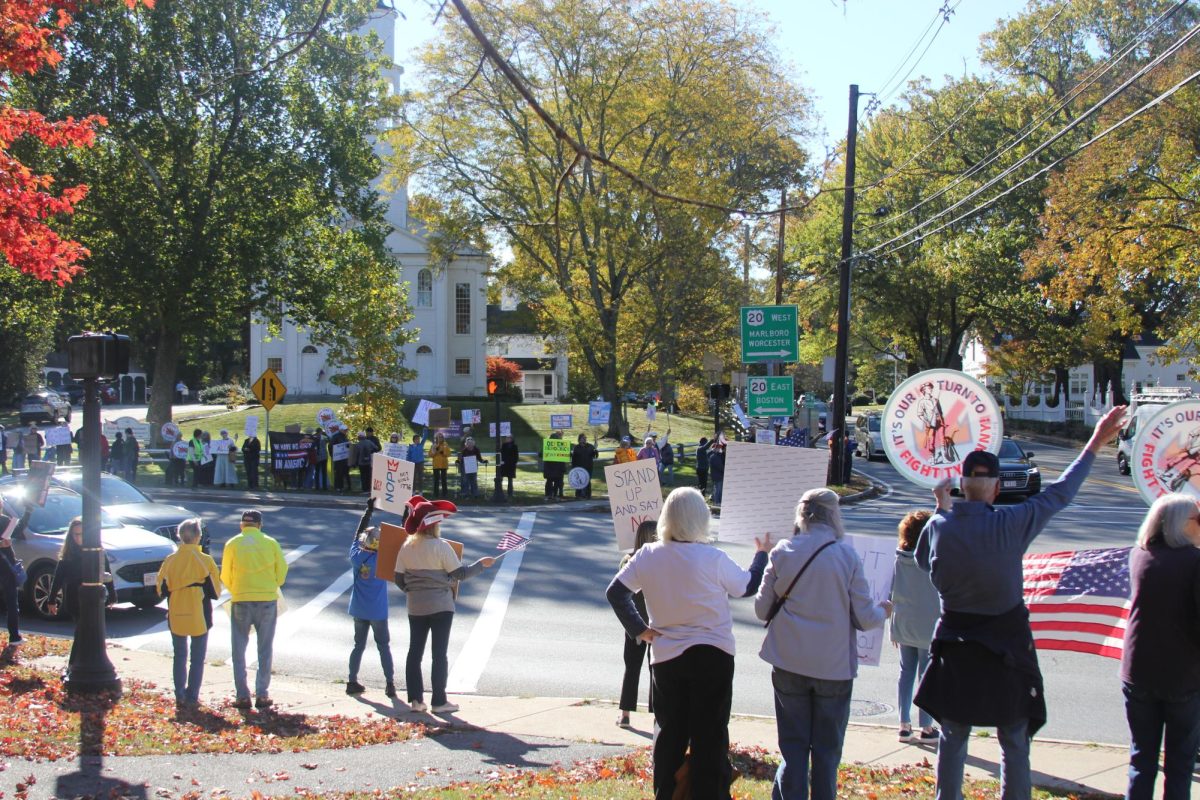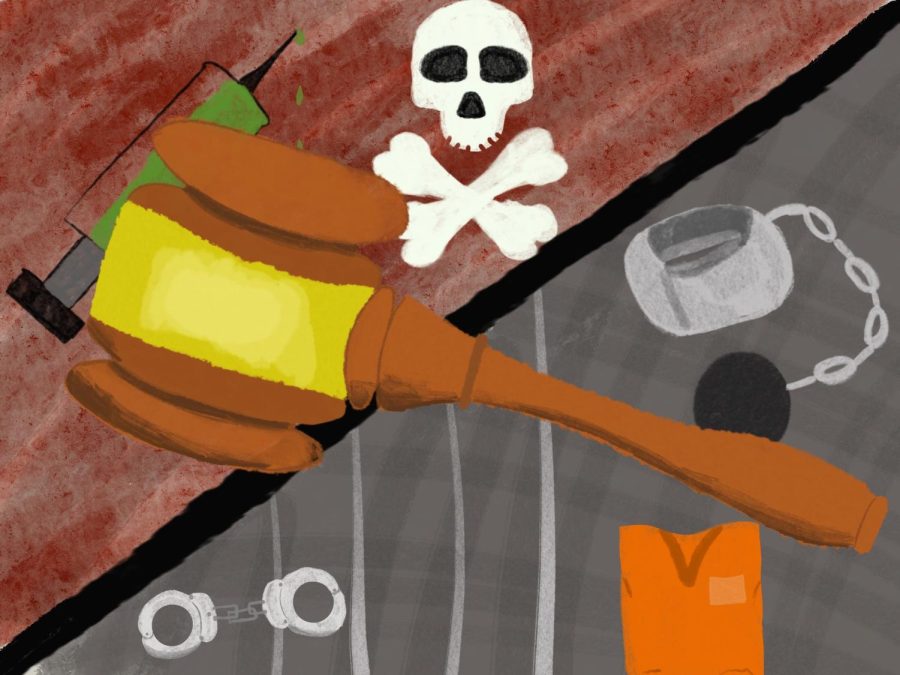Opinion: The Parkland shooter deserves life in prison
Credit: Nathan Crozier
WSPN’s Nathan Crozier discusses the affects of Parkland shooter Nikolas Cruz’s verdict of life in prison.
December 3, 2022
Four years ago, on Valentine’s Day, Parkland, Florida faced a horrific loss. Valentine’s Day is a time to give your heart to others, not to take lives away. Those who intentionally kill others should live out the rest of their days in a jail cell, rather than receive the death sentence. Nikolas Cruz is no exception in my eyes.
On February 14, 2018, Marjory Stoneman Douglas High School dealt with a school shooting, resulting in the death of 17 individuals. These losses were real people, some of them students, some faculty. The man responsible was then 19-year-old Nikolas Cruz, now 24, who was arrested 82 minutes after the shooting, walking down a street two miles from Stoneman Douglas.
I lived briefly in Parkland, just a mere four miles away from Stoneman Douglas. I knew many people who were close to those that were killed. I moved away just a year before that mass tragedy. Through social media, I saw the pain of those who knew individuals that didn’t make it out of the school that day.
Cruz’s trial began on July 1, 2022. Cruz pled guilty, so a majority of the trial related to how severe his punishment would be. I watched the proceedings live, curious as to how they would sentence Cruz. The trial concluded on October 13, 2022, with the judge declaring that Cruz serve out a life sentence, rather than be put to death. Nine individuals of the jury voted for his death penalty, while three were against it. The jury had taken into consideration that there were mental health and family issues that influenced Cruz’s actions on that horrific day.
I was grief-stricken upon hearing news of the shooting. I witnessed many people who I cared for suffer in anguish from losing their loved ones. The pain that the victims’ families felt—to never be able to see the victims again, to talk with them or express their love for them—must’ve been unbearable for them.
I was comforted to see karma doing its part, as Cruz was finally getting what he deserved. Life in prison forces Cruz to face the sins of his actions and endure the suffering he inflicted upon the families. I am glad to see it.
The death penalty has been a contentious point for a long time. Some families and friends of murder victims believe that the death of the killer will bring them closure. However, grief prevents many victims of loss from attaining closure. I’ve lost loved ones and proceeded to lash out at others, but I’ve realized that doing this didn’t help me heal. This grief that I, and several others have experienced, may cause some individuals to lash out towards juries for not voting for the death penalty.
The death of the individual does not solve all issues relating to closure. For many, healing and feeling closure over a loved one’s murder is not something that can be solved by the killer’s death.
Life in prison is the best sentencing for Cruz to experience the emotional pain he inflicted upon the victims’ families. With the detrimental mental health effects that many incarcerated individuals face, this prolonged suffering might be the most painful thing for Cruz, rather than this imprisonment being cut short by execution. Regardless of his background, he committed a heinous crime. He deserves to pay the price.
I once thought that death was the only solution for a killer, yet over time, I have come to believe that life in prison is the most fair sentencing a killer can receive. It’s understandable that the mindset of those close to the victim believe the killer’s death will, somehow, fill the void in their hearts. Yet, grief is not an open and closed situation; it never leaves the families.
The court made the correct decision by sentencing Cruz to life in prison. In a case as grave as this, the court’s decision properly executes an equal punishment to the suffering Cruz has caused countless families. Life in prison ensures that the monster rots in his cell, forces him to face his sins and forever be punished until he takes his final breath.















![This year, the Wayland team is made out of a JV team and a varsity team. There is a wide range of grades from eighth grade to twelfth grade that make up the teams. " [What] I will miss most [about the seniors] is their willingness to be involved," sophomore Mackenzie Grogan said. "Whether it was with school drama or referee frustration, they were really good at listening and giving good advice."](https://waylandstudentpress.com/wp-content/uploads/2025/10/8F0FD331-F005-4C3F-9F77-402D1C1953D6_1_201_a-1200x800.jpg)












TruthandFact • Jan 27, 2023 at 8:39 PM
There are many arguments why the death penalty should be abolished. Here is why they will always have little if any merit.
The argument which states that the death penalty does not deter murder is weakly grounded at best. Dismissing capital punishment on that basis requires us to eliminate all prisons as well because they do not seem to be any more effective in the deterrence of crime.
Another argument proposes that States which do have the death penalty have higher crime rates than those that don’t, that a more severe punishment only inspires more severe crimes. The truth is that every State in the Union is different. These differences include the populations, number of cities, and yes, the crime rates. Strongly urbanized states are more likely to have higher crime rates than states that are more rural, such as those that lack capital punishment. The states that have capital punishment are compelled to have it due to their higher crime rates, not the other way around.
Death Penalty opponents also hold the notion that criminals do not fear death because they do not take time to think about the consequences of their acts. If that were true, then how do police officers manage to arrest criminals without killing them. When a policeman holds a criminal at gunpoint and tells him to get on the ground, the criminal will comply fully in the vast majority of these cases. Why would they do so unless they were afraid of the lethal power of the gun? It is because regardless of what the death penalty opponents claim, criminals are not immune to fear. It is a misconception to believe that fear is a thought process that has to be worked out with a piece of paper. It’s not. It is an instinct that automatically kicks in when one is faced with lethal force.
Another cliched argument is the question: “Why do we kill people to show that killing people is wrong? That two wrongs do not make a right, therefore, executions are equivalent to murder.” The term ‘murder’ is specifically defined as the UNLAWFUL killing of a person with malice and aforethought. So logically, the word ‘murder’ cannot be used to describe executions since the death penalty is the law. To do so is an obvious abuse of semantics. Second, comparing executions to murders is like comparing incarcerating people to kidnapping. There is a difference between violent crime and punishment. Is there a contradiction in a policeman speeding after a speeder to enforce speeding laws? One displays a serious lack of moral judgment to believe that just because two practices share a physical similarity means that they are morally identical. Law enforcement officials act well within the law when they punish criminals whether it be by charging fines, incarcerating them, or conducting executions, thereby defending public safety. What separates crime from punishment, good from evil are not their physical aspects but rather their moral aspects. And moral aspects examine the reasons and motivations behind one’s actions. Abolitionists focus on the death penalty’s physical aspects to demonstrate that it is the same as murder while completely ignoring its moral aspects, therefore demonstrating their complete lack of moral coherence.
Still another cliched argument used is that we should value all human life, even the most violent and despicable ones. Believers in that philosophy push the notion that there is nothing more to humanity than the physical traits that identify our species. There is an entire spiritual aspect to humanity they completely ignore. Anybody can be physically human. All that is, is an accident of genetics. It is the spiritual aspects of humanity that actually define who and what we are. Moral assessments are based on one’s acts and character, not on his race or species, the latter which death penalty opponents often use as an excuse to canonize murderers. Allowing one’s species to hold more weight than his character is the foundation of racism. When a culture develops the moral coherence to recognize humanity as more a spiritual thing than just some physical thing, they will have no excuse to allow, tolerate, or preserve evil just because it hides inside a physical human shell.
No doubt ones intelligence is insulted when death penalty opponents have the impudence to claim that they are motivated by their ‘reverence for human life’ when the only people they are interested in preserving are those who display the least of it; the very least reverence for human life. And to add injury, they claim to sympathize with the victims families at the same time. In essence, they are supporting the worst of criminal behavior at the cost of pain and suffering.
One of the more risible and least respected claims is that putting a murderer to death is more expensive then keeping them in prison. This is by far the most ‘made-to-order’ argument for death penalty opponents. Defense attorneys purposely file every type of frivolous motion and lawsuit to delay an execution thereby creating more cost. They are creating a financial burden on society to keep the very worst human beings alive and then using the consequences of their own actions to justify an anti-death penalty argument.
Finally and perhaps the most sophomoric argument is that executing a murderer won’t bring back his or her victim. They never explain how putting murderers in prison for life is any more capable of such a miracle. That is not the point of executions and it never was. Justice is not about bringing back the victims nor it it about revenge. Justice is about enforcing consequences for one’s own actions to endorse personal responsibility. We cannot expect anyone to take responsibility for their own actions if these consequences are not enforced in full.
GDay • Dec 11, 2022 at 11:49 PM
Thank you for sharing this article. As a mother of four sons (similar in age), two with mental health issues, I have watched the entire trial and thought very hard about this all. The victim’s families have suffered, will continue to morn, and all hope is that they can find peace. However, killing another will never change this. The families voiced their anger to Nikolas Cruz at the end of the trial, and in a way killed him with their words, before he was led off in chains to his life in prison (most likely solitary confinement). A life long fate almost unimaginable. Nikolas’s mental issues were a time bomb that were bound to go off, especially after the death of his mother (the only life-line he had left). His severe mental problems were never addressed and followed through properly. These significant problems, pertinent information, and people (who did sound the alarms) were ignored, mishandled, and covered up in a complete societal brake down and failure. There were also obvious problems with biased leaders in the court during the trial. Yes, the jury got it right. Anger is a mask that disguises extreme sadness. Mental Illness is something most do not understand unless they live with it or around it. Too often people ignore, bully, abuse, hide, and shun the mentally ill ..rather than reach out before it’s too late. In the end, everyone will need to find forgiveness to find peace. God is Grace.
Charlotte Siu • Mar 6, 2023 at 2:18 PM
I would have to disagree with you on this though. If you have followed the trial you would have realized that his mother did ABOVE AND BEYOND the call and duty of a parent to get him the mental health help he needs. Evil is not a mental health issue.
Dmr • Dec 3, 2022 at 12:56 PM
So Wrong,NO Justice for the Families that were murdered, should have gotten Death Penalty!!!!!!!!!!